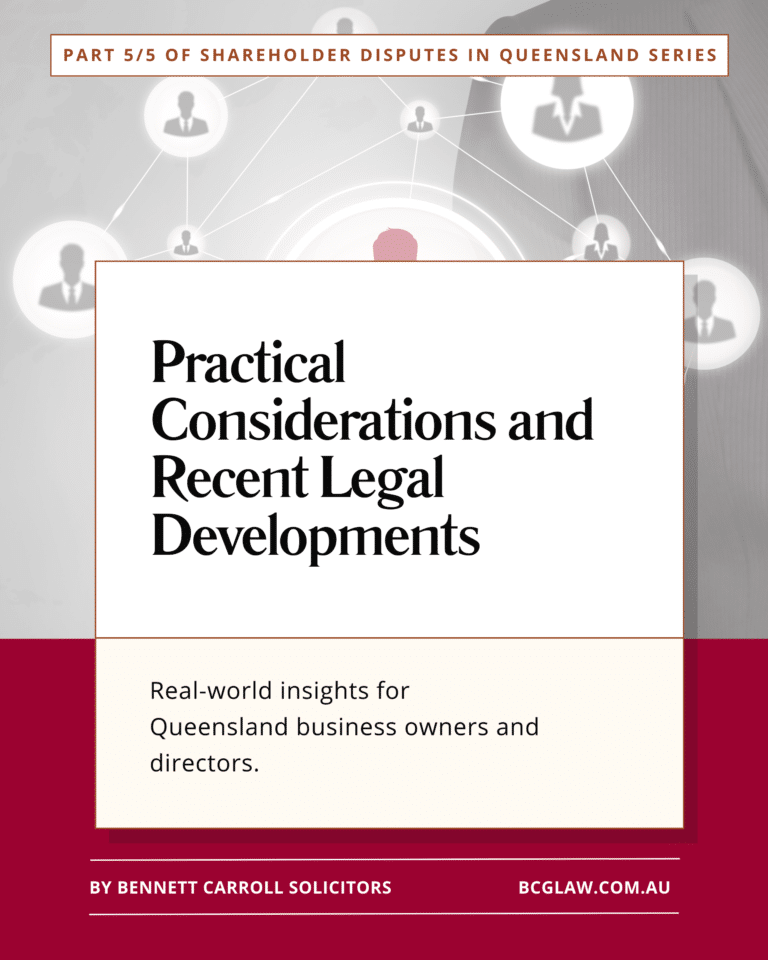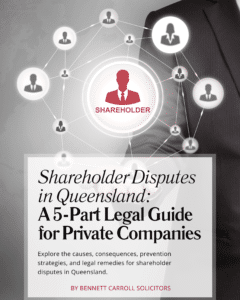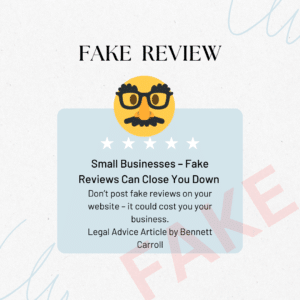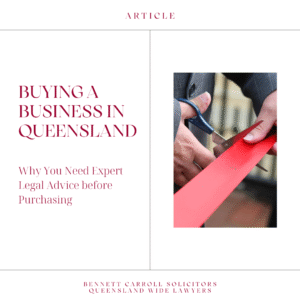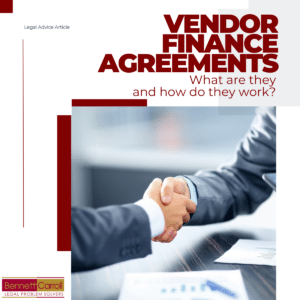Welcome to Part 5 of our 5-Part Legal Guide on Shareholder Disputes in Queensland.
In this series, we will explore the key aspects of shareholder disputes, with a focus on private companies in Queensland. Whether you’re a business owner, shareholder, or legal professional, understanding the common causes, legal frameworks, and resolution strategies for these disputes is essential for the stability and success of your business.
Explore the full series on Shareholder Disputes in Queensland:
Part 1: Causes, Impacts & Early Warnings
Part 2: Legal Frameworks & Shareholder Rights
Part 3: Prevention Strategies
Part 4: Dispute Resolution & Stakeholder Strategies
Part 5: Practical Tips & Recent Developments
Practical Aspects of Resolving Shareholder Disputes
Beyond legal considerations, practical factors significantly influence the resolution of shareholder disputes.
Costs and Timeframes
The financial and time costs of shareholder disputes vary widely depending on resolution methods:
- Negotiation and mediation typically cost the least and resolve the fastest, often within weeks or months
- Arbitration generally costs more than mediation but less than litigation, with timeframes ranging from months to a year
- Litigation represents the most expensive and time-consuming option, potentially lasting years and incurring significant legal fees
Court applications for the appointment of liquidators should be made only after negotiations are exhausted (unless there is some factor requiring Court orders to be made immediately), noting that litigation can result in erosion of the business’ value or its perceived value/reputation. Liquidator fees erode funds otherwise available to the shareholders, and the business could potentially be acquired by a third party rather than remaining with the shareholders.
Business Impact Management
Managing the impact of disputes on ongoing business operations requires careful planning:
- Establish clear protocols for business decisions during the dispute
- Ring-fence dispute management from day-to-day operations where possible
- Develop communication strategies for employees, customers, and suppliers
- Implement financial management protocols to maintain stability
- Consider bringing in interim management if necessary
Valuation Challenges
Share valuation often becomes a central issue in shareholder disputes, particularly when buyouts are contemplated:
- Different valuation methodologies may yield significantly different results
- Timing of valuation can substantially affect outcomes
- Discount for minority shareholdings can be contentious
- Access to information affects valuation accuracy and reliability
- Independent expert valuations may help bridge disagreements
Queensland-Specific Considerations
While shareholder disputes follow similar patterns nationwide, several factors are specific to Queensland:
Queensland Court System
The Supreme Court of Queensland has jurisdiction over shareholder disputes, with proceedings typically initiated in the Commercial List. The court actively encourages alternative dispute resolution before proceeding to trial.
Regional Business Considerations
Queensland’s geographically diverse business landscape creates unique considerations:
- Regional businesses may face challenges accessing specialised legal advice
- Distance may complicate face-to-face negotiations or mediations
- Industry-specific factors (such as tourism, agriculture, or mining) may influence dispute dynamics
- Local business communities may offer informal resolution channels
- Reputation management may be particularly important in close-knit regional business communities
Resolving Specific Types of Shareholder Disputes
Different types of shareholder disputes may call for specialised approaches.
Deadlock Situations
When shareholders or directors are evenly divided on key decisions, deadlock can paralyse a company:
- Review the constitution and shareholder agreement for deadlock-breaking mechanisms
- Consider appointing an independent director or chairperson with casting vote
- Explore mediation to find compromise positions
- Consider structured buy-sell arrangements
- As a last resort, court-ordered winding up may be necessary on “just and equitable” grounds
Exit Disputes
Disagreements often arise when shareholders wish to exit the company:
- Refer to any pre-existing exit provisions in shareholder agreements
- Engage independent valuers to determine fair share value
- Consider staged buyouts if immediate full payment is impractical
- Explore vendor financing or earnout arrangements
- Structure exits to minimise tax implications
- Document all exit terms comprehensively
Financial and Dividend Disputes
Conflicts regarding financial management and dividend policies require careful handling:
- Review historical dividend practices and any established policies
- Assess company financial capacity for distributions
- Consider independent financial review
- Explore compromise positions such as partial dividends
- Document agreed financial reporting and transparency measures
Recent Developments in Shareholder Dispute Law
The legal landscape for shareholder disputes continues to evolve through case law developments and statutory reforms.
Recent Court Decisions
Queensland and federal courts regularly refine the application of shareholder rights and remedies through their decisions. Recent trends include:
- Increasing emphasis on evidence of oppressive conduct beyond mere disagreement
- Growing recognition of shareholders’ legitimate expectations based on prior conduct and informal arrangements
- Evolving approaches to valuation methodologies in court-ordered buyouts
- Refined understanding of when “just and equitable” winding up is appropriate
Regulatory Developments
Regulatory changes also influence the shareholder dispute landscape:
- ASIC’s updated guidance on shareholder rights and corporate governance
- Changes to financial reporting requirements for proprietary companies
- Increasing focus on director accountability and duties
Practical Tips for Queensland Business Owners
Business owners can take several practical steps to navigate shareholder disputes effectively.
Proactive Measures
Preventative actions are always preferable to reactive dispute management:
- Implement comprehensive, professionally drafted shareholder agreements
- Review and update governance documents regularly
- Maintain clear communication channels among shareholders
- Document important decisions and their rationales
- Conduct regular shareholder meetings with proper minutes
- Provide transparent financial reporting to all shareholders
When Facing a Dispute
If a dispute arises despite preventative efforts:
- Seek legal advice early before positions become entrenched
- Gather and preserve all relevant documentation
- Consider the business impact of different resolution paths
- Remain open to compromise solutions
- Explore alternative dispute resolution before litigation
- Maintain professional communication throughout the process
Seeking legal advice from lawyers with significant experience in shareholder disputes is recommended by experts. A legal professional can assess the situation, advise on rights and obligations, and recommend the most appropriate course of action.
Towards Effective Resolution
Shareholder disputes in Queensland private companies present complex challenges requiring both legal knowledge and practical wisdom to navigate successfully. Understanding the legal framework, shareholder rights and obligations, and available resolution pathways provides a foundation for addressing these disputes effectively.
While this guide offers a comprehensive overview, each dispute presents unique circumstances requiring tailored approaches. Early prevention through well-drafted agreements and good governance practices offers the best protection against disruptive disputes. When conflicts do arise, exploring negotiated solutions before resorting to litigation typically preserves the most value for all parties.
Professional legal advice from practitioners experienced in Queensland shareholder disputes remains essential for navigating these complex situations successfully. With informed guidance, even the most challenging shareholder disputes can reach resolution, allowing businesses and their owners to move forward productively.
Understanding the Oppression Remedy
The oppression remedy represents one of the most powerful tools available to shareholders in disputes, particularly for minority shareholders facing unfair treatment.
The Legal Framework for Oppression Claims
Under sections 232-234 of the Corporations Act 2001, shareholders can seek court relief when company affairs are conducted in a manner that is:
- Contrary to the interests of shareholders as a whole
- Oppressive to, unfairly prejudicial to, or unfairly discriminatory against a shareholder or shareholders
This remedy provides flexibility for courts to intervene in private company dynamics when fairness principles are violated, even when technical legal requirements have been followed.
Common Examples of Oppressive Conduct
Oppressive conduct can take many forms in private companies:
- Exclusion of minority shareholders from management or information
- Improper diversion of corporate opportunities or assets
- Excessive remuneration to majority shareholder-directors while withholding dividends
- Dilution of shareholdings through selective share issues
- Related-party transactions on unfavourable terms
- Misuse of corporate funds for personal benefit
Available Remedies
Courts have broad discretion to order remedies for oppression, including:
- Requiring the purchase of the oppressed shareholder’s shares at fair value
- Regulating the company’s affairs in the future
- Modifying or repealing provisions in the company’s constitution
- Appointing a receiver or manager
- Ordering access to company books and records
- Requiring compensation be paid
Conclusion: Navigating Shareholder Disputes with Confidence
Shareholder disputes in Queensland, especially within private companies, can be complex and challenging, but they don’t have to overwhelm you. By understanding the key legal frameworks, rights, obligations, and available dispute resolution pathways, you can proactively manage these disputes to protect your business. Whether you’re facing a deadlock, an exit dispute, or concerns about financial transparency, knowing your options and seeking early legal advice is crucial.
While this series has provided valuable insights into preventing and resolving shareholder disputes, every case is unique. If you’re facing a shareholder dispute or want to ensure your business is prepared, Bennett Carroll Solicitors can help guide you through the process with tailored legal advice and practical solutions.
Concerned about potential disputes? Contact Bennett Carroll Solicitors for expert legal advice on shareholder conflicts in Queensland. Our expert Commercial Lawyers are here to assist you. With offices across Brisbane, Gold Coast, Sunshine Coast, and Ipswich, we’re ready to help. Contact Bennett Carroll Solicitors today.
External resources:


